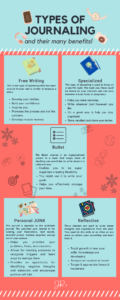Journaling and its many virtues
Do you remember rushing home from school and throwing yourself on the bed to pour your heart into a spiral bound notebook? There was such relief in those wide ruled pages. Or how you saved money in your piggy bank so that you could buy a diary with a lock, so your elder brother couldn’t read your  notes?
notes?
But lots of us wrote as teenagers and then grew up and stopped. Now journaling is making a huge comeback. And rightly so. Journaling offers incredible physical and emotional benefits that go beyond that teenage diary catharsis. Did you know journaling can help you heal injuries faster and boost your IQ?
If you haven’t journaled in awhile, here are some incredible scientifically established benefits of journaling that will inspire you to get into the habit:
- Increased productivity – a study by HBS for a group of people who journaled versus not was a 25% increase.
- Improved communication – Writing enables us to think and express our thoughts clearly, doing it often enough helps us with clear communication verbally as well. A Stanford study established the critical relationship between writing & speaking and how once improves the other.
- Boosted cognition – per the Journal of Experimental Psychology reflective writing reduces intrusive thoughts and improves working memory. This frees up our cognitive resources for other mental activities.
- Improved overall well-being – A Cambridge university study found that even writing for 15-20 minutes after a stressful or traumatic experience led to improvements in both physical and psychological health.
- Better sleep – Very often we go to bed and our mind is flooded with thoughts. Journaling before bed as found by the Journal of Experimental Psychology decreases worry, rumination and brain stimulation allowing us to fall asleep sooner and stay asleep.
What’s the best way to start journaling? Is there an ideal time of day? How long should it take? How many pages? Well, there are no rules to it. How you journal is much less important than why you are doing it: To get something off your chest. To have quiet time with your thoughts. To gain clarity. To  separate the harmful from the insightful. To prepare for the day ahead and review the day that passed. There’s no right way or wrong way of going about it. The point is to do it. For someone who is not in a habit of writing, it may seem overwhelming so here are some tips-
separate the harmful from the insightful. To prepare for the day ahead and review the day that passed. There’s no right way or wrong way of going about it. The point is to do it. For someone who is not in a habit of writing, it may seem overwhelming so here are some tips-
- Start small – start with something easy. Gratitude for people and things experiences is an easy start and creates positivity as well.
- Create your own schedule – Even a 1 time writing of 15 minutes can be very beneficial so there is no pressure to write everyday, go with the flow, at your own pace and slowly increase it.
- Try different techniques – You can write on paper or use an app. A mode that you can carry with you so you are able to do it when you need to. Also, there are various types and methodologies of journaling, adopt one that resonates with you. Or have a mix bag. Watch this space for more details.
- Use journaling prompts – Depending on what you are working through, you can use specific prompts which are questions or statements for you to think and write about. It could be memories, travels, future or retrospective based questions. Use what you need to help write and get clarity to move forward.
- Make it a habit – Journaling can be a lot like exercise. Very often I hear people say, I feel so great after I exercise but getting myself to the gym can be a pain. Similarly, making journaling a habit will take some accountability, but do it at a pace which brings ease and joy.
As Robin Sharma says “Discovering yourself, who you are. Your gifts, your talents, your dreams, is being comfortable with yourself. Spend time alone, write a journal. It reminds you of your goals and of your learning in life. It offers a place where you can hold a deliberate, thoughtful conversation with yourself.”

